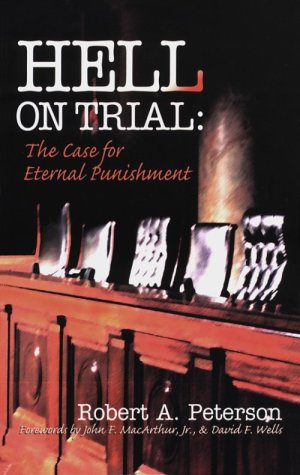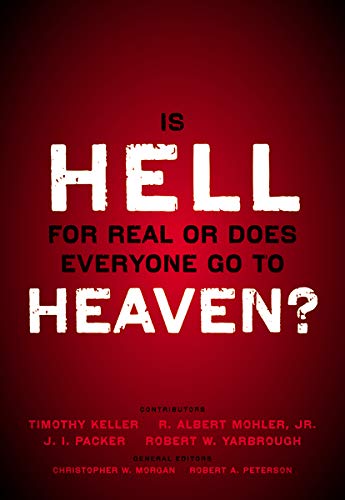Quotes about Hell-Warnings
[The] denial of hell in the name of grace discourages people from the grace [such a person claims to] love, while leading [the individual] toward the hell [one] hates and denies… He who thinks he’s not drowning won’t reach for the life preserver.
The Grace and Truth Paradox, 2003, Used by Permission from Eternal Perspective Ministries, www.epm.org, p. 74-75.
God’s grace faces hell’s reality straight on, offering full deliverance. Denying hell takes the wind out of grace’s sails. If there’s no eternal hell, the stakes of redemption are vastly lowered. What exactly did Jesus die to rescue us from?
The Grace and Truth Paradox, 2003, Used by Permission from Eternal Perspective Ministries, www.epm.org, p. 75. Get this book!
To say that life eternal shall be endless, [but that] punishment eternal shall come to an end is the height of absurdity.
If there is any truth in Scripture at all, this is true – that those who stubbornly refuse to submit to the Gospel, and to love and obey Jesus Christ incur at the Last Advent an infinite and irreparable loss. They pass into a night on which no morning dawns.
If there is any truth in Scripture at all, this is true – that those who stubbornly refuse to submit to the gospel, and to love and obey Jesus Christ, incur at the Last Advent an infinite and irreparable loss. They will pass into a night on which no morning dawns.
Commentary on Colossians and Philemon, Expositor’s Bible, vol. 31, Armstrong, 1905, p. 300.
Wicked men will hereafter earnestly wish to be turned to nothing and forever cease to be that they may escape the wrath of God.
Some talk of it as an unreasonable thing to fright persons to heaven, but I think it is a reasonable thing to endeavor to fright persons away from hell. They stand upon its brink, and are just ready to fall into it, and are senseless of their danger. Is it not a reasonable thing to fright a person out of a house of fire? Or is it not the duty of a parent to warn their child running toward the edge of a cliff?
Do we who have the care of souls know what hell is? Have we seen the state of the damned? Are we aware how dreadful their case is? Do we know that most people go there unaware of their danger? And do we see that our hearers are not aware of their danger? If we knew all this, it would be morally impossible for us to avoid passionately telling them the dreadfulness of that misery and their great exposure to it. We would cry aloud to them!
Distinguishing Marks of a Work of the Spirit of God, 1741. Modern language courtesy of Archie Parrish, The Spirit of Revival, Crossway Books, 2000, p. 82.
When ministers preach about hell and warn sinners to avoid it in a cold manner – though they may say in words that it is infinitely terrible – they contradict themselves. For actions…have a language as well as words. If a preacher’s words represent the sinner’s state as infinitely dreadful while his behavior and manner of speaking contradict it – showing that the preacher does not think so – he defeats his own purpose. The language of his actions in such a case is much more powerful than the bare meaning of his words.
Distinguishing Marks of a Work of the Spirit of God, 1741. Modern language courtesy of Archie Parrish, The Spirit of Revival, Crossway Books, 2000, p. 82.
Suffering in this life is at least partly a warning to us, a foretaste of the eternal suffering we deserve outside of Christ.
The Story of Love by Michael Lawrence taken from Biblical Theology by Michael Lawrence, copyright 2010, Crossway Books, a division of Good News Publishers, Wheaton Illinois 60187, www.crosswaybooks.org. Page 150.
I know that many wiser and better Christians than I in these days do not like to mention heaven and hell even in a pulpit. I know, too, that nearly all the references to this subject in the New Testament come from a single source. But then that source is Our Lord Himself… These overwhelming doctrines…are not really removable from the teaching of Christ or of His Church. If we do not believe them our presence in this church is great tomfoolery. If we do, we must sometime overcome our spiritual prudery and mention them.
Your shrinking from this truth about hell is not due to your sympathy with people’s pain. It is due to your lack of sympathy with their pain. God is the one who is sympathetic. He is the one who gave His only begotten Son to rescue us from this misery and to inform us insistently, dogmatically, and compassionately that we are in for an awful end if we persist in unbelief. Don’t say that you feel for people when you blunt the edge of the word of the Spirit. What have you ever done that shows that you truly feel for sinners’ eternal pain? Denying the truth of God’s Word about it certainly offers them no help whatsoever.
People need to be discomforted and delivered over to distress by indomitable preaching that insists that if they refuse the love of God extended to them in the Lord Jesus Christ, they are going to be physically tormented! … God is so seriously in earnest about this that during the Tribulation, He will warn people through the loud voice of an angel. This angel will tell them that if they worship the beast or his image or receive his mark, they will be “tormented with fire and brimstone in the presence of the holy angels, and in the presence of the Lamb” (Rev. 14:9-10). You are on the wrong side of this issue if you ridicule sincere preaching that warns “with a loud voice” about the dreadful hurt of hell!
Sin is best defined in relation to God’s perfect character; at root it is an attack against His holiness. It must therefore be punished. Although three kinds of punishment are spoken of in Scripture – preventative, remedial, and retributive – only the first and last pertain to hell. Warnings of hell are preventative for all who heed them, but those who reject God’s warnings will endure His retributive punishment forever.
Hell on Trial: The Case for Eternal Punishment, P&R Publishers, 1995, p. 220. Used by permission.
So the meaning of away from the presence of the Lord does not mean that God is absent in every sense, but in those senses [His love which produces His pleasures forevermore/fullness of joy]. God will be terribly present in another sense. All reality continues to say: In Him we live and move and have our being. And it is still in hell that no one can hide from the Lord or escape the terrible countenance of His anger. So God’s power is present in hell as the One who sustains our being and the One who enforces justice and the One who maintains suffering. He is present in all the ways men do not want Him to be present and none of the ways that believers enjoy His presence.
Used by permission of Desiring God Ministries, www.desiringgod.org/interviews/is-god-everywhere-and-absent-from-hell.
God considers it right and suitable that those who rejected Christ see Him triumphant, pure, and justified over all who considered Him unworthy of their trust [Rev. 14:10]. The focus…is not that those in hell have the privilege of seeing what they enjoy, but that they have the remorse of seeing what they rejected.
Used by permission of Desiring God Ministries, www.desiringgod.org/articles/the-presence-of-the-lamb-and-the-sufferings-of-hell.
True belief in both heaven and hell radically changes the way we live on earth. We are encouraged by the hope of heaven, and we are compelled by the horror of hell. We know that this world is not all that exists. We know that every person on the planet is only here for a brief moment, and an eternity lies ahead of us all – an eternity that is either filled with ever-increasing delight or never-ending damnation.
Taken from Follow Me by David Platt. Copyright © 2013 by David Platt. Used by permission. Website: Radical.net. Page 87.
As people listened to Jonathan Edwards preach in the eighteenth century, they were “urged to consider the torment of burning like a livid coal, not for an instant or a day, but for “millions and millions of ages,” at the end of which they would know that their torment was no nearer to an end than ever before, and that they would “never, ever be delivered.”
Taken from Follow Me by David Platt. Copyright © 2013 by David Platt. Used by permission. Website: Radical.net. Page 85.
If I never spoke of hell, I should think I had kept back something that was profitable, and should look on myself as an accomplice of the devil.
The saddest road to hell is the one that runs under the pulpit, past the Bible, and through the middle of warnings and invitations.
What would you say of the man who saw his neighbor’s house in danger of being burned down, and never raised the cry of “fire?” What ought to be said of us as ministers if we call ourselves watchmen for souls, and yet see fires of hell raging in distance, and never give the alarm? Call it bad taste, if you like, to speak of hell. Call it charity to make things pleasant, and speak of smoothly, and soothe men with constant lullaby of peace. I have not read my Bible. My notion of charity is to warn men plainly of danger. My notion of taste in the ministerial office is to declare all the counsel of God.
Will hell be everlasting? All the way back in the Old Testament, Daniel 12:2, “Many of those who sleep in the dust of the ground will awake, these to everlasting life, but the others to disgrace and everlasting contempt.” Matthew 25:46 “These will go away into eternal punishment, but the righteous into eternal life.” In this verses, the word translated “eternal” is the same one used for both heaven and hell. Heaven and hell parallel each other for eternity. They both stand or fall together. Jesus in Matthew 18:8 calls hell and “eternal fire.” Three times, Mark says of those in in hell, “Their worm will not die” (Mk. 9:44, 46, 48; cf. Isa. 66:24). When Jude speaks of false teachers in hell he says “for whom the black darkness has been reserved forever” (Jude 13). 2 Thessalonians 1:9, “These will pay the penalty of eternal destruction, away from the presence of the Lord and from the glory of His power.”
Hell is real, but God has provided salvation from Hell through Christ. God in His love warned us about hell and did so in the most serious of words. God is not cruel, He is love. If anything we are cruel when we believe this and fail to tell others about the hope they can have in Jesus. Therefore the Christian gospel maintains that today “the day of salvation” is now (2 Cor. 6:2), during this lifetime. Embrace Jesus as your Lord and Savior from hell, because once you die, the grace of God is no longer extended, only God’s justice against your unforgiven sin. And God’s justice will come with holy and righteous severity.
It is as reasonable for preachers to warn against hell as it would be for a sentinel to warn of an approaching army or a weatherman an approaching tornado.
The Spirit of Revival by Archie Parrish, Introduction, Copyright 2000, Crossway Books, a division of Good News Publishers, Wheaton Illinois 60187, www.crosswaybooks.org. p. 29.
Oh, what would the damned in hell give for a sermon, could they but listen once more! They would consent, if it were possible, to bear ten thousand years of hell’s torments, if they might but once more have the Word presented to them! If I had a congregation such as that would be, of men who have tasted the wrath of God, of men who know what an awful thing it is to fall into the hands of an angry God, how would they lean forward to catch every word.
If sinners will be damned, at least let them leap to hell over our bodies. And if they will perish, let them perish with our arms around their knees, imploring them to stay. If hell must be filled, at least let it be filled with the teeth of our exertions, and let not one go there unwarned and unprayed for.
We rob the gospel of its power if we leave out its threatenings of punishment.
You are hanging over the mouth of hell by a single thread, and that thread is breaking. Only a gasp for breath, only a stopping of the heart for a single moment, and you will be in an eternal world, without God, without hope, without forgiveness. Oh, can you face it?
It is a very remarkable fact that no inspired preacher of whom we have any record ever uttered such terrible words concerning the destiny of the lost as our Lord Jesus Christ.
The vague and tenuous hope that God is too kind to punish the ungodly has become a deadly opiate for the consciences of millions.
The problem here is the obvious lack of understanding of the infinite nature of sin as contrasted to the infinite righteousness of God. If the slightest sin is infinite in its significance, then it also demands infinite punishment as a divine judgment. Though it is common for all Christians to wish that there were some way out of the doctrine of eternal punishment because of its inexorable and unyielding revelation of divine judgment, one must rely in Christian faith on the doctrine that God is a God of infinite righteousness and well as infinite love. While on the one hand He bestows infinite grace to those who trust Him, He must, on the other hand, inflict eternal punishment on those who spurn His grace.




















